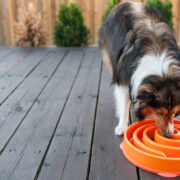Are poinsettias poisonous to cats? Are poinsettias poisonous to dogs? No, actually. You might be surprised to hear that this popular holiday plant isn’t toxic to your pets. Researchers at Ohio State University’s College of Food, Agricultural, and Environmental Science disproved the myth that poinsettias are poisonous to pets back in 1971. Yet somehow, their bad rap persists.
That’s not to say that cats and dogs can go ahead treat it like it’s salad during the Christmas season. If eaten in large quantities, pets can still get mild symptoms of discomfort.
So, what’s with the myth around this Christmas flower? And what plants actually warrant a call to the animal poison control center or a visit to the DVM?
“…generally over-rated in toxicity.”
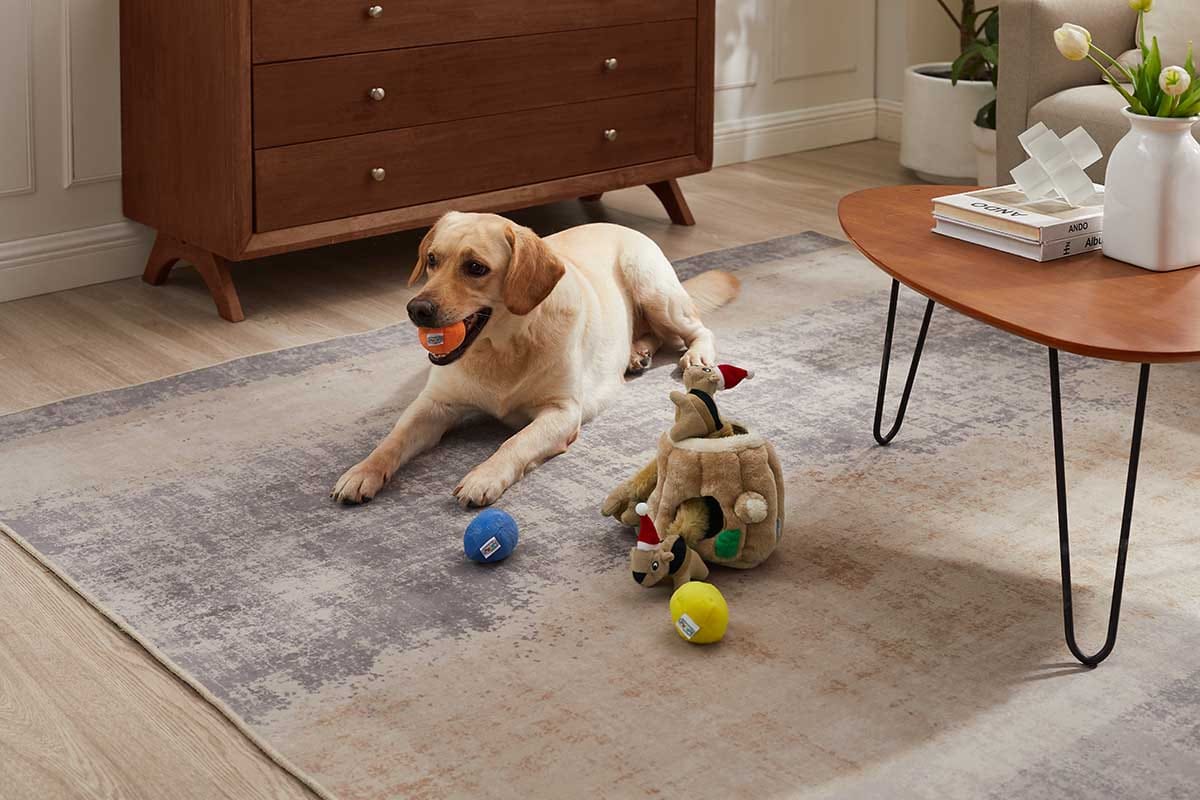
That is a direct quote from the ASPCA’s website on toxic and non-toxic plants. The clinical signs they list are kind of like allergy symptoms mixed with general gastrointestinal upset: “Irritating to the mouth and stomach, sometimes causing vomiting but generally over-rated in toxicity.”
Even the Pet Poison Helpline states the poinsettia plant is not among poisonous plants you need to worry about during the holiday season.
While poinsettias are commonly “hyped” as poisonous plants, they rarely are, and the poisoning is greatly exaggerated.
– Pet Poison Helpline
Common signs of poinsettia sensitivity in pets
- mild signs of vomiting
- drooling
- diarrhea (rarely)
- eye irritation
- skin irritation (redness, swelling, itchiness)
The skin irritation may come from physical contact with the milky white sap.
The Pet Poison Helpline says that unless clinical signs of poinsettia toxicity are severe, medical treatment is rarely necessary.
Poinsettia Myth vs. Fact
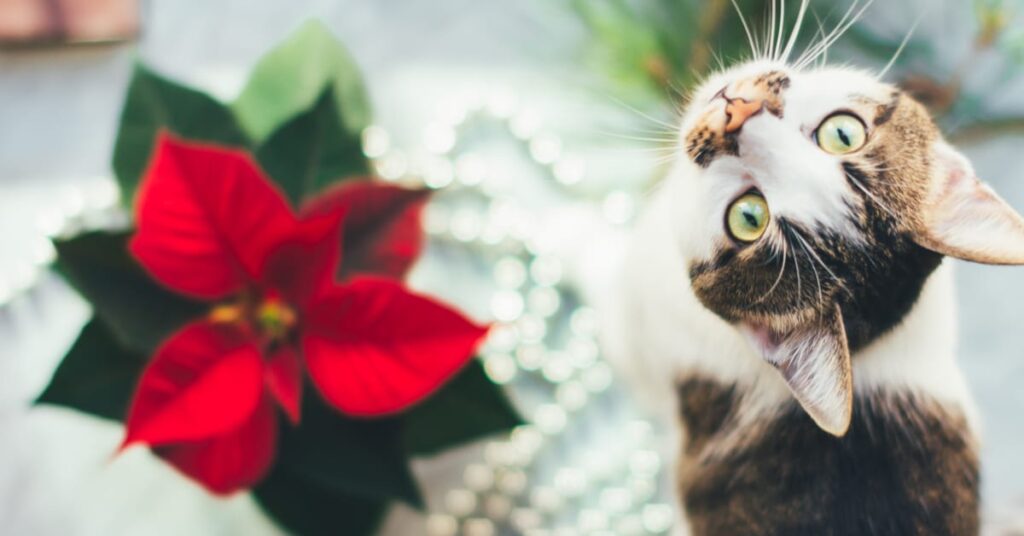
Poinsettias go by many names: Euphorbia pulcherrima, lobster flower, and flame leaf flower, among others. The possible origin of these festive plants being highly poisonous dates all the way back to 1919. It came from an uncorroborated report of a child who died after chewing on poinsettia leaves.
It may also stem from the fact that the botanical family of Euphorbia is known to have toxic latex sap, but the sap of poinsettias is innocuous enough. The sap contains a toxic chemical called diterpenoid euphorbol esters. Someone with a latex allergy or has a sensitivity to detergents may get symptoms of contact dermatitis.
The Ohio State Study
Researchers disproved the myth that poinsettia is poisonous by testing on rats. After feeding 500-600 poinsettia leaves to these rats, researchers concluded that the rats “show no mortality, no symptoms of toxicity, nor any changes in dietary intake or general behavior pattern.”
In other words, these rats were fed an extraordinarily large amount of parts of the plant and had zero symptoms. No poinsettia poisoning.
Christmas Plants Poisonous to Dogs and Cats
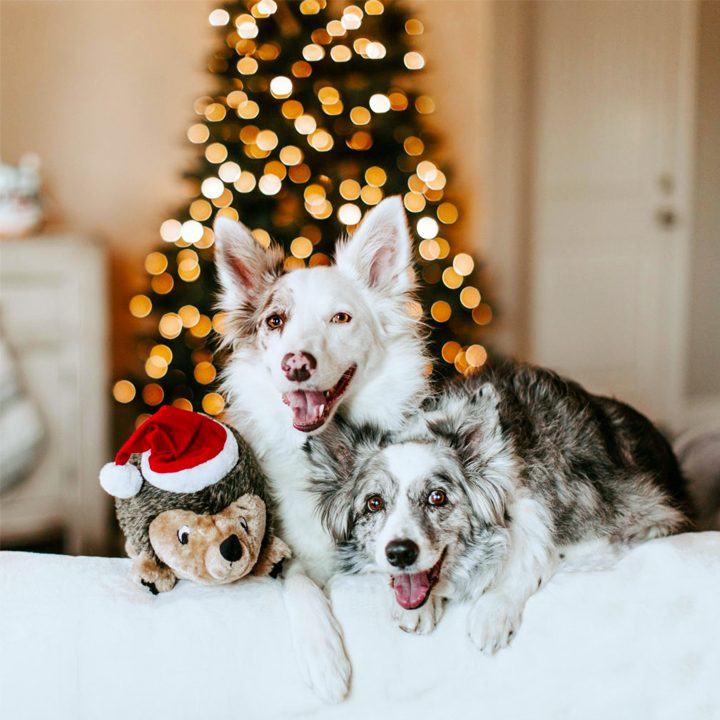
Now that you know poinsettias aren’t going to bring an end to your pet’s life, let’s talk about what holiday plants pet owners should keep away from them at all costs.
These are the holiday plants that are toxic to dogs and cats:
- mistletoe
- holly and holly berries
- amaryllis/blub plants
If mistletoe is swallowed, get to the vet as soon as you can. According to Washington State University, mistletoe can cause vomiting, severe diarrhea, difficult breathing, shock, and death within hours of ingestion.
Holly berries contain saponins that can make your pet have nausea, vomiting, and diarrhea. Bulb plants like amaryllis and bouquets of easter lilies cause vomiting, depression, diarrhea, abdominal pain, hypersalivation, anorexia, and tremors.
While not toxic to pets, plants like Christmas trees (needles) and Christmas cactus pose a choking hazard and should be kept out of your pet’s reach as well. Smaller dog breeds are most at-risk.
Keeping Cats and Dogs Safe Around the Holidays
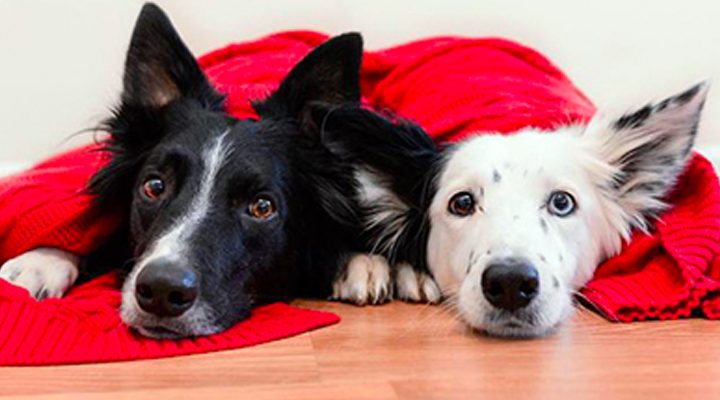
While decorating your home for the holidays is lovely, be careful of where you put what in order to prevent an accident. The time of year for Christmas decorations like tinsel and holly can be hazardous.
Don’t place holiday decorations or human food that is toxic to pets in the home at the expense of your pet’s health and wellness. As long as you are mindful, you can keep your pets safe and happy.
For a complete list of houseplants that are toxic (and safe) for pets, check out:
